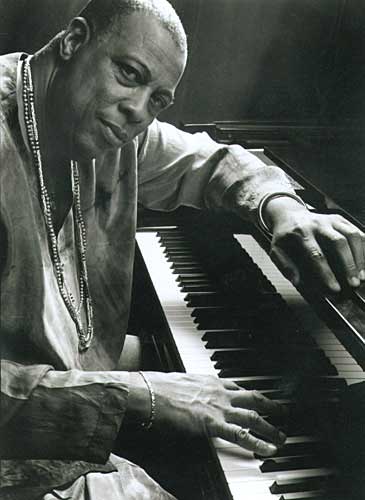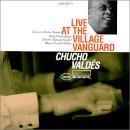

Courtesy of
Chucho Valdes

Blue Note Records
![]()

Blue Note Records
![]()
A
CONVERSATION WITH CHUCHO VALDES
JAZZ WEEKLY: How did you come to play the piano?
CHUCHO VALDES: I don't know how I got started. My father was a pianist
and so was my mother. At the age of three, I was already playing the piano.
I was already playing melodies. When they saw the possibility of me playing
the piano, they got me a private tutor at the age of five. I started attending
music school. I needed a tutor other than my father so that the tutor
would be more strict than my father. I was in music school from the age
of nine until I was sixteen.
JW: Did you feel pressured being the son of Bebo Valdes?
CHUCHO VALDES: No, the contrary, I have always been a big fan of my father.
So what I have always wanted was to be more like him as a musician, but
I never felt any pressure because I never had big aspirations. I simply
wanted to be like him.
JW: When your father defected in 1960, why did you stay behind?
CHUCHO VALDES: He left to make records in Mexico and then he fell in love
with a woman in 1963 and got married and currently is living in Spain
with his family, sons and grandchildren. It was his own choice to leave
and I remained in Cuba to study my music. I could not abandon my studies.
I was studying composition, etcetera. To me, my career was everything.
JW: When was the Cubana de Musica Moderna formed?
CHUCHO VALDES: I was just part of it. I was one of the selected musicians.
This occurred in March of '67. I was very happy to be one of the few that
had been selected. That was when the best orchestra in Cuba got formed.
There we were working for seven years.
JW: And then in 1973, you helped form Irakere.
CHUCHO VALDES: Irakere was formed in 1973, seven years after the orchestra.
JW: Were you surprised by Irakere's success?
CHUCHO VALDES: I was never too pretentious. I was very studious. I never
had big aspirations of being the best, but I have always loved my studies
and I was very serious about my work. That is why everything has worked
out for me so far.
JW: Some of the well-known members of Irakere like Paquito D'Rivera and
Arturo Sandoval decided to call the United States their home, why have
you not followed suit?
CHUCHO VALDES: Because a person decides on his life according to one's
beliefs and as such, moving is a very personal decision. And I think that
everyone is free to decide and have the right to choose where to live
and everyone has to respect that. I think that Paquito and Arturo have
done very well. They are both part of my life because I worked with them
for so long. They have been work companions and companions in life. We
have been together in the good times and the bad times and that is something
unforgettable. It has nothing to do with politics. I am a musician, not
a politician. I am just a worker that does his job. That is why I don't
criticize anyone and get myself into politics.
JW: Is it difficult to obtain a visa to perform in the States?
CHUCHO VALDES: Those are things that have nothing to do with me. It is
my lawyers that do all the paperwork. I don't want to think. I have dedicated
all my mental power to my music. Those are unnecessary worries, although,
now it is easier to obtain a visa because there is a cultural exchange
between the States and Cuba. As far as musicians are concerned, it ends
with that, especially for the Plaza Festival, which is held in Havana
and I am the president. It is an honor to have American musicians coming
over to our festival because to me, the United States is the most prominent
musical force on the planet. It is wonderful to be able to come and perform
in the States, as well as to have American music back in Cuba.
JW: Your feelings towards the outdated Cuban embargo, does it need reform?
CHUCHO VALDES: That is not my world.
JW: But it is part of your world. You exist in Cuba, which has long had
to endure through this country's ineffective policy toward the island
nation.
CHUCHO VALDES: I think that music is the universal language and you shouldn't
mix that with anything. The human development is related with the exchange
among humans. One gains knowledge, but also contributes and the beneficiary
is the human himself. For example, we can talk about Latin jazz as a function
of both musicians from the United States and Cuba like Chano Pozo and
Dizzy Gillespie, a Cuban and an American. One contributed with the Afro-Cuban
rhythm and the other with jazz and that was the most beautiful thing in
the world. Now, Latin jazz exists in the universe. I don't know what would
have happened if there hadn't been a cultural exchange. Latin jazz would
not have existed for the people. How would the Buena Vista Social Club
ever have existed? It originated from the union of an American, Ry Cooder
and the Cuban artists. That is something that will become part of history.
A man cannot live secluded in his own world. One has to share and exchange
and develop by taking elements from other worlds. I believe the cultural
exchange is essential, not just for the United States and Cuba, but for
the entire world.
JW: So your thoughts on the whole Elian Gonzalez incident.
CHUCHO VALDES: Now, you trying to put me in a world that is not mine.
If you were to ask me in what year a certain jazz player was born and
died, then that information I know. Elian is not part of my world because
he has to do with politics. My interest is only music.
JW: How do you manage to play the piano so effectively with those huge
fingers and hands? You are after all, 6' 6''. Don't they tend to get in
the way?
CHUCHO VALDES: (Laughing) I could have been an NBA player. I love basketball
or I could have been a boxer like Muhammad Ali. Now, the size of my hands
helps me and since I have larger hands, I can go from key to key with
no problem. I can fit an octave with no problem. I have pretty fast hands
(laughing).
JW: Do you consider yourself a virtuoso?
CHUCHO VALDES: No, I consider myself a virtuoso when it comes to studying.
JW: Were you a nerd?
CHUCHO VALDES: I always did excellent, hundred percents in music. I did
well in every single musical class I was in. In elementary school, I did
very well, especially in Spanish and math.
JW: Let's touch on your Blue Note release Bele Bele en La Habana.
CHUCHO VALDES: It is an unforgettable recording. We did it with the quartet.
It has everything in it, different Cuban rhythms. It has compositions
from Cuban musicians, some from Puerto Rico.
JW: And the follow up to Bele Bele en La Habana, Briyumba Palo Congo.
CHUCHO VALDES: It is more in the Afro-Cuban line. It is not as traditional
as Bele Bele en La Habana. It is based more on congo.
JW: And lastly, your latest release, Live at the Village Vanguard.
CHUCHO VALDES: The last one is the best out of the three. You can feel
the heat that is created between the audience and the musicians. It is
much hotter than the other two with more of a variety. The other two were
good as well.
JW: Were you intimidated in doing a live recording from the Vanguard,
considering Bill Evans and John Coltrane made landmark recordings at the
venue?
CHUCHO VALDES: No, it only stimulated me.
JW: Do you smoke cigars?
CHUCHO VALDES: No, I have never smoked. I don't like cigars. I can say
I hate the smoke. Even growing up, although it wasn't a proven fact that
smoking was harmful, I still didn't like it. I would run away from them.
JW: So you live a healthy life?
CHUCHO VALDES: I think I live a pretty healthy life.
JW: There are a good many fine musicians coming out of Cuba, is there
something in the water or the food?
CHUCHO VALDES: I think we are all made out of the same matter, just like
other Caribbean Islands like Puerto Rico and Santo Domingo. But our island
is much bigger in comparison to the size of the others. Therefore, there
is a larger number of habitants, which leads to a larger number of musicians.
The number makes a difference, but besides that, music has developed very
rapidly due to the music schools that have been created for the younger
generations and that is very important for the development. If one has
talent, then they certainly can get an education. It somewhat has to do
with Cuban blood, Spanish and African. It is very hot.
Comments? Email
US.